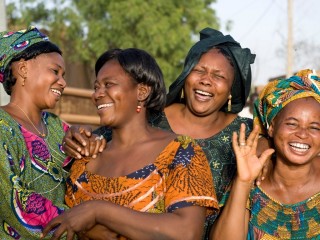Project Results:
Demo eco-toilets in women training centre
Training of women in construction maintenance
About
This small project aimed to construct 8 eco-composting toilets, installed by women who were also trained as professional plumbers. Two toilets are accessible for wheelchairs, two are low-cost ‘household’ type. The faeces and the urine will be re-used on the farm of the vocational school. The women are also responsible for the training on hygiene/water/sanitation and for maintaining the facilities. A unique way of building local capacity by women, in a region with hardly any facilities for safe drinking water and sanitation.
Note that the big challenge for this project was the difficult security situation in the region. This delayed the project for 2 years, as material and knowledge (from experienced trainers) could not reach the project.
Key results
-
4 toilets, of which 2 eco-toilets and wheelchair-accessible.
-
Access to sanitation: 65 women and teachers attending school, 20 children.
-
Training of 8 women in construction maintenance.
-
12 families of each 10 persons were informed on the toilets: 120 persons access to hygiene education and health facilities.
-
Farm of the school is supplied, start of selling harvest due.
Tips for the future
-
Not so much of a tip, rather a fact: security is crucial for developing any kind of (innovative) business.
-
For local people who are new to it, ‘business thinking’ needs time to sink in.
Potential for growth
There is no real business model yet developed, mainly caused by the difficult security situation the region is in. Further (grant) funding will be needed and once the area will open up again, this project could serve as a starting point for further developments in the eco-toilets business.
Project partners
Stichting VAM, Association Tuma Barama
Period
November 2015 – December 2018
Location
Bandiagara, MaliLast project updates
Background
Mali is an extremely poor country but undeniably high in potential. It has high child mortality rates, lack of hygiene and water scarcity. Water-bourne diseases are a major problem in Mali. Due to the fact that girls rarely were allowed to go to school, 80% of adult women are illiterate. Not having received much formal education, their prospects in providing for their extended families, by being gainfully employed are low.
The subregional authority (cercle) of Bandiagara consists of the city and the villages which are very poor. You can say this is a real grassroot project in a poor region whith least priviliged communities. A region hardly any facilities for save drinkingwater and sanitation, so the project will have a positive impact in the field of water and sanitation but also in the labour market because women will construct the facility as paid professional and probably maintaining the facilities and by training other women it will become a great social impact. (expend base).
Project Plan
The project plan has an integrated approach:
Technological: constructing eco-toilets; Sustainable: Integrated in the school; Sociocultural: gender aspects , women will be trained influences their families and empowered themselves. Governance: developing an organisation which is engaged in items of water etc. an organisation in which women have an important role.
It will be a project of capacity buiding of women in a field of water and hygiene
Time-line:
month 1-3: building the eco-toilets
month 2: training the school's teachers
month 2-4 training women plumbers
month 6-9 development module on reuse and training trainers
month 5-9 business training of women who want to use their training to get work
month 4-9 training 100-150 women
month 5-9 developing the organisation
month 9: evaluation
Target group
Direct beneficiaries:
150 female students
10-12 staff
50 childeren in the crèche
8 women will be trained as professional plumber
The project might have a large spin off. (difficult to quantify)
Sustainability
The project respects FIETS as a guide for sustainability.
Overview of Goals
Primary objective of the project is:
- introducing eco-toilets, their use ( fullness )and application
- ameliorating hygiene and saving water
- education on water, sanitation and hygiene
Results and indicators
- capacity gained
- women trained on construction and maintenance 8 ( target )
- Improved sanitation
- Taps and sink for hand washing 4 ( target )
- visitors and children of trainees use the toilets 100% ( target )
- Toilet blocks of which one accessible for wheelchair 8 ( target )
- Compost and urine used in school garden



